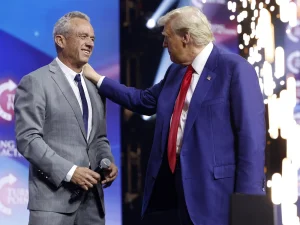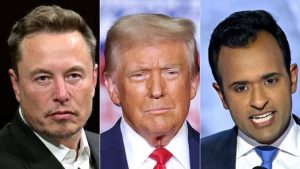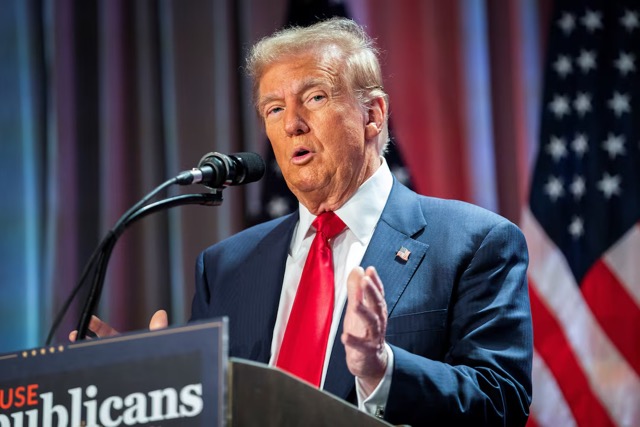 President-elect Donald Trump’s cabinet picks, announced since his November election win, have ignited a firestorm of debate over qualifications and potential conflicts of interest, prompting Wyoming Star (WS) to seek expert analysis from Ellen M. Key, a political professor at Appalachian State University, on what to expect after the January 20 inauguration.
President-elect Donald Trump’s cabinet picks, announced since his November election win, have ignited a firestorm of debate over qualifications and potential conflicts of interest, prompting Wyoming Star (WS) to seek expert analysis from Ellen M. Key, a political professor at Appalachian State University, on what to expect after the January 20 inauguration.
RFK Jr. at HHS: A Risky Appointment?
Robert F. Kennedy Jr.’s tumultuous 2024 presidential bid, culminating in an August endorsement of Donald Trump after a short-lived independent campaign, has landed him the controversial nomination for Secretary of Health and Human Services (HHS), marked Trump’s campaign pledge to let Kennedy “go wild on health,” raising concerns among critics citing RFK Jr.’s history of promoting scientifically discredited claims.
These include the debunked link between vaccines and autism, the unfounded assertion that fluoridated water is toxic, and the denial of the HIV-AIDS connection – stances that directly contradict established scientific consensus and threaten public health initiatives.

WS: Robert F. Kennedy Jr.’s nomination as Secretary of Health and Human Services (HHS) has generated significant controversy. What are the potential implications of this appointment? How much of this is political maneuvering?
Ellen M. Key: Kennedy Jr.’s appointment to head HHS is deeply troubling. His anti-vaccine views directly contradict the overwhelming scientific consensus, posing a significant risk to public health. HHS oversees critical agencies like the CDC, FDA, and NIH — agencies tasked with protecting public health and advancing medical research. Placing someone with such demonstrably unscientific views at the helm could severely damage these institutions’ credibility and effectiveness.
This appointment clearly has a significant political component.
President Trump’s choices often reflect his personal loyalties and policy preferences. However, this nomination goes beyond typical political appointments. The sheer weight of Kennedy Jr.’s misinformation on vaccines — information that has demonstrably harmed public health — makes this appointment irresponsible, if not dangerous. While presidents have the right to nominate, the Senate’s role is to ensure nominees are qualified and capable.
Given Kennedy Jr.’s background, it’s questionable if he meets the minimum criteria.The potential for damage to public health is simply too great to ignore.
The nomination raises profound questions about whether political expediency trumps the well-being of the nation. It also casts a shadow over other HHS nominees, some of whom, like Mehmet Oz and Martin Makary, possess relevant scientific backgrounds but also share a history of criticizing the medical establishment.
Their ability to transition from critics to effective leaders will be crucial.
Musk and Ramaswamy’s “DOGE” Initiative: A Threat to Democratic Processes?
Trump’s “Save America” plan hinges on significant government restructuring and cost-cutting, spearheaded by the newly formed Department of Government Efficiency (DOGE). The non-governmental task force, headed by billionaires Elon Musk and Vivek Ramaswamy, will aim to slash federal spending through workforce reductions, program cuts, and regulatory reform.
Musk, the world’s richest person, actively campaigned for Trump’s reelection, and his platform X (formerly Twitter) has become a stronghold for Trump’s supporters, highlighting a close alignment. DOGE’s non-governmental status bypasses standard ethics reviews and background checks, with Musk and Ramaswamy vowing to serve without pay. The name itself, a seeming nod to Musk’s fondness for Dogecoin, underscores the unconventional nature of this initiative, which Trump has boldly compared to the Manhattan Project in scope and ambition, claiming it reflects a long-held Republican goal.

WS: Elon Musk and Vivek Ramaswamy have been tasked with identifying government inefficiencies. What are the implications of their involvement, particularly given Musk’s previous affiliation with the Democratic Party? How do you assess this initiative, given historical criticisms of similar attempts?
Ellen M. Key: This initiative, whatever its name, represents a concerning disregard for established democratic processes. While the President-elect has the right to seek advice, the power to create departments and allocate budgets belongs to Congress. Musk and Ramaswamy’s recommendations for massive spending cuts, without the proper legislative framework, attempt to circumvent this fundamental aspect of our government. Musk’s past party affiliation is less important than the inherent conflict of interest. His companies, especially SpaceX, have received billions in government contracts. This creates a strong incentive for him to recommend cuts that benefit his own enterprises while potentially harming competitors.
Consider the potential impact on policies like rural broadband expansion or EV tax credits. Musk could advocate for changes that disadvantage competitors while benefiting his own interests — a clear conflict of interest that should disqualify him from advising on such matters.
Previous attempts to circumvent Congressional budget authority have failed, most notably Nixon’s efforts which led to the Impoundment Control Act.
This initiative risks repeating past mistakes, undermining the principle of checks and balances and potentially creating further gridlock. The focus should be on ensuring transparency and adhering to established legislative procedures, not on granting extraordinary power to individuals with obvious conflicts of interest.
The lack of congressional oversight in this initiative presents a significant threat to democratic governance.
====
Overall, the choices made by President-elect Trump, from the HHS Secretary to the DOGE initiative, represent significant shifts in policy and approach. The coming weeks and months will reveal how these decisions impact the country, with the Senate confirmation process and Congressional oversight playing crucial roles.









